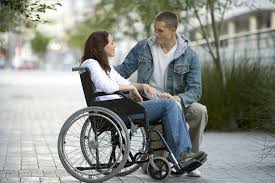It seems sometimes that the advice that you get from your
parents (if any, sadly, in this day and age) can be boiled down to mindless
platitudes of the sort you’d find on inspirational posters, which don’t fully
deal with the truth behind the situation.
 |
"My Dad told me that life is 90% positive attitude.
Maybe you're just paralyzed because you aren't being positive enough?!" |
For example, people in my generation were told by their
parents to buy a home as soon as they could upon entering the work force. This was a result of that generation’s
generally making decent money on their homes, as home values increased during
that time period. The cynic in me also
thinks that driving up demand for homes by encouraging your children to buy
them is also a good way to increase the value of your home, too, but that’s
just too cynical for me to buy into fully.
 |
Why would I be suspicious of a group of people who spent all of their retirement,
voted to spend the social security trust fund, and now expect my generation to fund their 30 year vacation starting in the prime of their working life, because they haven't saved enough to fund it, themselves?? |
The issue is that they never really explained to us the true
implications of home ownership, and the pitfalls therein. “Buy a house, as soon as you can” does not
translate into “oh, and make sure you get a good deal on it, and that when you buy,
the prices aren’t artificially inflated by a housing bubble created by the
government encouraging risky business practices for political means.”
Also, “buy a house as soon as you can” doesn’t translate
very well into “on a fixed-rate mortgage that you can afford.” As I’ve discussed before, the Boomers handed
down to us a very poor understanding of taking on debt to buy something like a
home. It essentially boiled down to “can
you afford the payments?” and didn’t deal with any of the other pertinent
things like “will you be able to afford them once the ARM resets? Will you be able to sell the house in five to
ten years, because, oh, yeah, you really don’t want to pay a house off over the
term of any mortgage out there, because holy shit, have you looked at how much
you’ll pay for the house if you do?”
I'm not excusing the stupidity of the people in my generation that bought homes that they couldn't afford, but when "BUY A HOUSE AS SOON AS YOU CAN!!!eleventy!1!!" was their starting point, with no additional information, whatsoever, I think you can forgive them at least a little, right?
 |
"NO! I read in the newspaper that these 'millennial' kids are lazy and worthless,
and do the sex and smoke drugs, and I'm not about to change my opinion about the generation
that I expect to fund my retirement for me! They need to stay the hell off of my lawn!" |
I had some good training in basic economics, so when I
bought my home in 2003 for $132,000, I knew damn good and well that if I paid
the house off per the term of the mortgage (I got a 30 year fixed rate because
those ARM mortgages and subprimes are for people more concerned about what
their payments are going to be NOW than they are any other aspect of the loan,
which is moronic) that I would pay for the house three times over (or more) by the time I
got it paid off.
Yes, holy shit, that’s actually true. Did you ever sit down to calculate it? 360 payments of $1,084 (the payment for my
loan) is just shy of $400,000. That, my
friends, is why I scrimped and saved to make sure that I paid my house off in
ten years. That way, I “only” spent
$225,000 on a home that I bought for $132,000. Great deal, right?
 |
| "Thanks for the awesome investment advice, DAD!" |
My home, after owning it for 11 years, and with the improvements
I’ve made, is now worth about $250,000.
I’ve sunk another $50,000 in improvements into it over the years. So I’m still $25,000 behind on it, but based
on Boomer math, which ignores the interest cost, improvement cost, and everything else imaginable, I’ve
actually “made” $125,000 on it in ten years.
Yay me! The way I look at it,
I’ve paid $25,000 for a place to live over the last ten years, which is pretty
good – that’s $208 a month in rent payments. That's how you make home ownership pay off - by manipulating the inputs to make it so that you pay a lot less per month than you would in rent, because SOME of that value going out every month returns to you in equity. So the good people own a home to lose LESS money, not to make any.
I say all of this to explain one thing: I’ve spent $25,000
more on my home over the last ten years than I will get back from selling it, and I am one of the few home-ownership
success stories. I paid my home off
in ten years, did a massive amount of sweat-equity improvements, and I’m STILL
behind (if you don’t count the value of having
a place to live).
 |
| I'm told it is not over-rated at all |
I’m not saying this to discourage home ownership. It’s treated me well. $208 a month in rent is pretty damn good for
the place I’m living. I’m saying it to encourage
people to understand the real costs of home ownership, and to understand that your home is not a piggy bank. It is not an investment on which you
should plan to “make” money. It is not
your retirement account. It is, like
paying rent, a thing that you do to provide a home for your family and a place
to live. If you can make it work out
that the true cost would be lower than paying rent (which is actually pretty
common if you’re smart about it), then go for it. But don’t do it thinking you’re contributing
to a nest egg, because you’re not. You don't spend more money on an investment than that investment makes you in return, and call it an investment.
There is a huge cost to owning a home. If your $132,000 home won’t be worth $400,000
plus a decent rate of return in 30 years, you need to understand that, like
renting, you will have a net OUTFLOW of money over that thirty years for your
housing costs, and your home will not be an investment.
 |
| "Uhh, this isn't penciling out, Mr. Thompkins. Let me run the numbers again" |
The Boomers put home ownership out there to my generation like
it really was the biggest investment that you will ever have, when it isn’t an
investment at all, except for rare instances..
I had a guy tell me that the other day, and like always, I was just
shocked that an otherwise sentient adult would look at the numbers associated
with home ownership and think that it is perfectly okay for your home to be
your largest investment.
Mine isn’t. Your's shouldn't be. If it is, do something now, and do something drastic, because you are not in good financial shape.
 |
| NO, something more than that! |